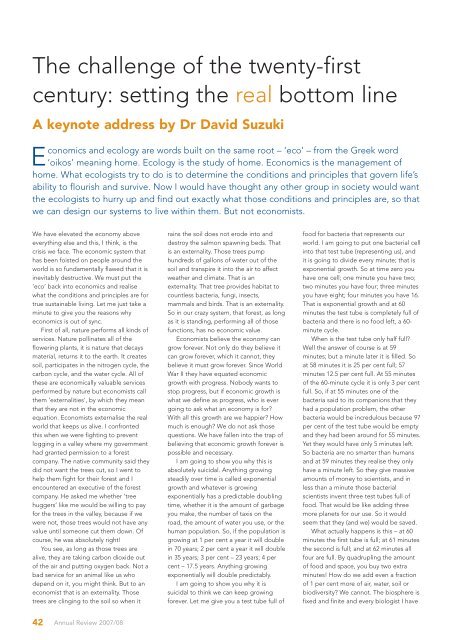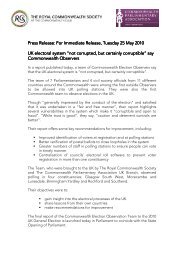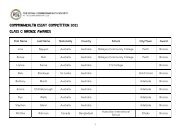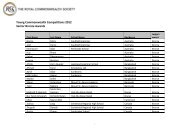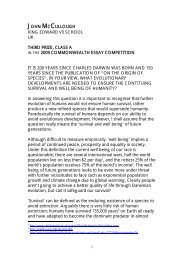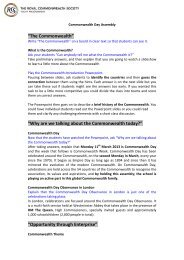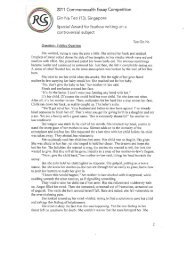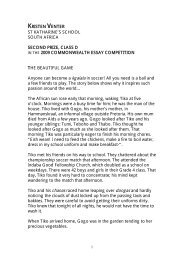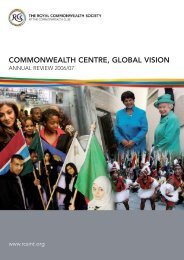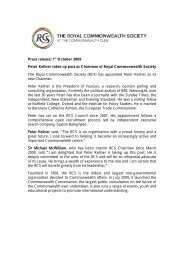Annual Review 2007-2008 - The Royal Commonwealth Society
Annual Review 2007-2008 - The Royal Commonwealth Society
Annual Review 2007-2008 - The Royal Commonwealth Society
Create successful ePaper yourself
Turn your PDF publications into a flip-book with our unique Google optimized e-Paper software.
<strong>The</strong> challenge of the twenty-first<br />
century: setting the real bottom line<br />
A keynote address by Dr David Suzuki<br />
E conomics and ecology are words built on the same root – ‘eco’ – from the Greek word<br />
‘oikos’ meaning home. Ecology is the study of home. Economics is the management of<br />
home. What ecologists try to do is to determine the conditions and principles that govern life’s<br />
ability to flourish and survive. Now I would have thought any other group in society would want<br />
the ecologists to hurry up and find out exactly what those conditions and principles are, so that<br />
we can design our systems to live within them. But not economists.<br />
We have elevated the economy above<br />
everything else and this, I think, is the<br />
crisis we face. <strong>The</strong> economic system that<br />
has been foisted on people around the<br />
world is so fundamentally flawed that it is<br />
inevitably destructive. We must put the<br />
‘eco’ back into economics and realise<br />
what the conditions and principles are for<br />
true sustainable living. Let me just take a<br />
minute to give you the reasons why<br />
economics is out of sync.<br />
First of all, nature performs all kinds of<br />
services. Nature pollinates all of the<br />
flowering plants, it is nature that decays<br />
material, returns it to the earth. It creates<br />
soil, participates in the nitrogen cycle, the<br />
carbon cycle, and the water cycle. All of<br />
these are economically valuable services<br />
performed by nature but economists call<br />
them ‘externalities’, by which they mean<br />
that they are not in the economic<br />
equation. Economists externalise the real<br />
world that keeps us alive. I confronted<br />
this when we were fighting to prevent<br />
logging in a valley where my government<br />
had granted permission to a forest<br />
company. <strong>The</strong> native community said they<br />
did not want the trees cut, so I went to<br />
help them fight for their forest and I<br />
encountered an executive of the forest<br />
company. He asked me whether ‘tree<br />
huggers’ like me would be willing to pay<br />
for the trees in the valley, because if we<br />
were not, those trees would not have any<br />
value until someone cut them down. Of<br />
course, he was absolutely right!<br />
You see, as long as those trees are<br />
alive, they are taking carbon dioxide out<br />
of the air and putting oxygen back. Not a<br />
bad service for an animal like us who<br />
depend on it, you might think. But to an<br />
economist that is an externality. Those<br />
trees are clinging to the soil so when it<br />
42 <strong>Annual</strong> <strong>Review</strong> <strong>2007</strong>/08<br />
rains the soil does not erode into and<br />
destroy the salmon spawning beds. That<br />
is an externality. Those trees pump<br />
hundreds of gallons of water out of the<br />
soil and transpire it into the air to affect<br />
weather and climate. That is an<br />
externality. That tree provides habitat to<br />
countless bacteria, fungi, insects,<br />
mammals and birds. That is an externality.<br />
So in our crazy system, that forest, as long<br />
as it is standing, performing all of those<br />
functions, has no economic value.<br />
Economists believe the economy can<br />
grow forever. Not only do they believe it<br />
can grow forever, which it cannot, they<br />
believe it must grow forever. Since World<br />
War II they have equated economic<br />
growth with progress. Nobody wants to<br />
stop progress, but if economic growth is<br />
what we define as progress, who is ever<br />
going to ask what an economy is for?<br />
With all this growth are we happier? How<br />
much is enough? We do not ask those<br />
questions. We have fallen into the trap of<br />
believing that economic growth forever is<br />
possible and necessary.<br />
I am going to show you why this is<br />
absolutely suicidal. Anything growing<br />
steadily over time is called exponential<br />
growth and whatever is growing<br />
exponentially has a predictable doubling<br />
time, whether it is the amount of garbage<br />
you make, the number of taxis on the<br />
road, the amount of water you use, or the<br />
human population. So, if the population is<br />
growing at 1 per cent a year it will double<br />
in 70 years; 2 per cent a year it will double<br />
in 35 years; 3 per cent – 23 years; 4 per<br />
cent – 17.5 years. Anything growing<br />
exponentially will double predictably.<br />
I am going to show you why it is<br />
suicidal to think we can keep growing<br />
forever. Let me give you a test tube full of<br />
food for bacteria that represents our<br />
world. I am going to put one bacterial cell<br />
into that test tube (representing us), and<br />
it is going to divide every minute; that is<br />
exponential growth. So at time zero you<br />
have one cell; one minute you have two;<br />
two minutes you have four; three minutes<br />
you have eight; four minutes you have 16.<br />
That is exponential growth and at 60<br />
minutes the test tube is completely full of<br />
bacteria and there is no food left, a 60minute<br />
cycle.<br />
When is the test tube only half full?<br />
Well the answer of course is at 59<br />
minutes; but a minute later it is filled. So<br />
at 58 minutes it is 25 per cent full; 57<br />
minutes 12.5 per cent full. At 55 minutes<br />
of the 60-minute cycle it is only 3 per cent<br />
full. So, if at 55 minutes one of the<br />
bacteria said to its companions that they<br />
had a population problem, the other<br />
bacteria would be incredulous because 97<br />
per cent of the test tube would be empty<br />
and they had been around for 55 minutes.<br />
Yet they would have only 5 minutes left.<br />
So bacteria are no smarter than humans<br />
and at 59 minutes they realise they only<br />
have a minute left. So they give massive<br />
amounts of money to scientists, and in<br />
less than a minute those bacterial<br />
scientists invent three test tubes full of<br />
food. That would be like adding three<br />
more planets for our use. So it would<br />
seem that they (and we) would be saved.<br />
What actually happens is this – at 60<br />
minutes the first tube is full; at 61 minutes<br />
the second is full; and at 62 minutes all<br />
four are full. By quadrupling the amount<br />
of food and space, you buy two extra<br />
minutes! How do we add even a fraction<br />
of 1 per cent more of air, water, soil or<br />
biodiversity? We cannot. <strong>The</strong> biosphere is<br />
fixed and finite and every biologist I have


